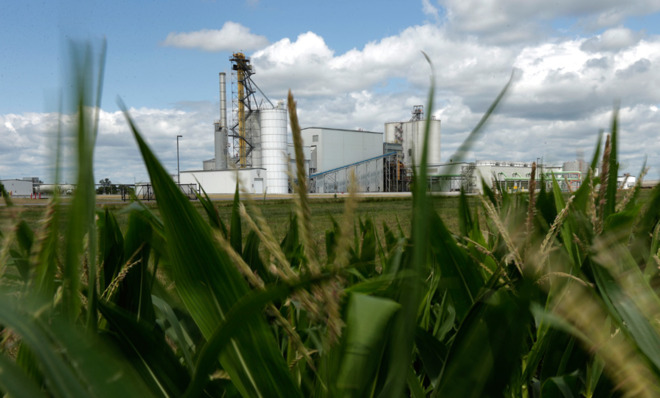Why everybody hates the ethanol mandate
Hostility to the law has made for some unlikely bedfellows

A free daily email with the biggest news stories of the day – and the best features from TheWeek.com
You are now subscribed
Your newsletter sign-up was successful
This week, the EPA is expected to announce changes to the ethanol mandate, a 2007 law that requires energy companies to mix billions of gallons of ethanol into gasoline and diesel fuels. After six years in the mix, corn-based ethanol has lost its popularity, and a diverse group of critics is calling for the law's repeal.
A proposal for the EPA's changes, leaked in October, would significantly scale back the ethanol-gas blend requirement to 2012 levels. "If approved, the proposed cut in the biofuel mandate in 2014 to 15.21 billion gallons from 18.15 billion would mark an historic retreat from the ambitious 2007 Renewable Fuel Standard (RFS) law that charted a path toward ever-greater use of clean, home-grown fuel," said Reuters at the time.
But many think such a "historic retreat" would be not nearly enough. An extensive investigation by the Associated Press, briefly published by accident last week, then republished as scheduled this week, outlined a variety of ways the mandate is "badly hurting the environment." Though ethanol fuel releases less carbon dioxide than other kinds of gas, many question if the side effects of production are worth it. "[I]n the president's push to reduce greenhouse gases and curtail global warming, his administration has allowed so-called green energy to do not-so-green things," says the AP.
The Week
Escape your echo chamber. Get the facts behind the news, plus analysis from multiple perspectives.

Sign up for The Week's Free Newsletters
From our morning news briefing to a weekly Good News Newsletter, get the best of The Week delivered directly to your inbox.
From our morning news briefing to a weekly Good News Newsletter, get the best of The Week delivered directly to your inbox.
Growing corn requires fertilizer, which requires natural gas to make. Fertilizer also has contaminated rivers and drinking water, says the report. And ethanol factories usually burn coal or gas, which dumps carbon dioxide into the atmosphere.
In addition, the ethanol mandate has pushed up corn prices, which gives farmers economic incentive to plow more land — a lot more land. "Five million acres of land set aside for conservation — more than Yellowstone, Everglades, and Yosemite National Parks combined — have vanished on Mr. Obama's watch," says the report. Not only does plowing grasslands destroy habitats, but it also releases huge amounts of carbon dioxide into the atmosphere.
Other opponents complain the mandate — like any energy subsidy — is free market poison, claiming it "distorts fuel markets and will raise gasoline prices, especially as the increased blending requirements collide with declining demand for gasoline," reports Politico.
The varying reasons to oppose ethanol have brought together an unlikely gaggle of opponents: The oil industry, Tea Party Republicans, and environmentalists.
A free daily email with the biggest news stories of the day – and the best features from TheWeek.com
"[I]t’s high time Congress acted to kill the mandate altogether," says Ryan Cooper in a column for The Washington Post.
The mandate was supposed to spark the development of cleaner biofuels (like “cellulosic” ethanol), which are compelling in theory. But it's been six years with no result, and the current situation is doing so much damage that it’s time to just cut our losses. Besides, a thriving biofuels industry already exists in the form of Brazilian sugarcane ethanol, which is unambiguously a big win on climate change. Biofuels research will continue, especially if the EPA manages new regulation on carbon dioxide.[The Washington Post]
Still others say the mandate leads to higher food prices. Tom Fletcher of Americans for Tax Reform:
With more and more quantities of ethanol being diverted to fuel instead of food, the price of products like milk, eggs, meat, or anything made with corn or its sweeteners has increased. Price-Waterhouse-Cooper along with the National Council of Chain Restaurants concluded that increased ethanol requirements will cost fast food and dine-in restaurants $2.5 billion and $691 billion, respectively. This means that, due to the ethanol mandate, every restaurant in the U.S. pays around $18,000 extra for food, inflated prices that are certainly passed to consumers. [Americans for Tax Reform]
Meanwhile, the ethanol industry is asking the AP to retract the story. “At best, the AP article is lazy journalism, but at worst, it appears purposefully designed to damage the ethanol industry,” American Coalition for Ethanol Executive Vice President Brian Jennings said in a statement to the press. “There was an incredibly reckless disregard for the truth in the handiwork of this hit piece.”
The lobby insists that ethanol produces 34 percent less greenhouse gas than gasoline, and that farmers plowed extra land because of drought.
(Correction: This article originally misstated the date on which the AP report was accidentally published. It has since been corrected. We regret the error.)
Carmel Lobello is the business editor at TheWeek.com. Previously, she was an editor at DeathandTaxesMag.com.
-
 Political cartoons for February 21
Political cartoons for February 21Cartoons Saturday’s political cartoons include consequences, secrets, and more
-
 Crisis in Cuba: a ‘golden opportunity’ for Washington?
Crisis in Cuba: a ‘golden opportunity’ for Washington?Talking Point The Trump administration is applying the pressure, and with Latin America swinging to the right, Havana is becoming more ‘politically isolated’
-
 5 thoroughly redacted cartoons about Pam Bondi protecting predators
5 thoroughly redacted cartoons about Pam Bondi protecting predatorsCartoons Artists take on the real victim, types of protection, and more